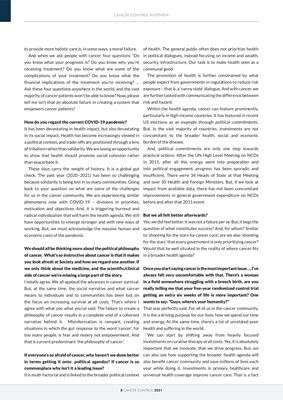
CANCER CONTROL INTERVIEW
8 CANCER CONTROL 2021
of health. The general public often does not prioritize health
in political dialogues, instead focusing on income and wealth,
security, infrastructure. Our task is to make health seen as a
communal good.
The promotion of health is further constrained by what
people expect from governments in regulations to reduce risk
exposure - that is, a 'nanny state' dialogue. And with cancer, we
are further tasked with communicating the difference between
risk and hazard.
Within the health agenda, cancer can feature prominently,
particularly in high-income countries. It has featured in recent
US elections as an example through political commitments.
But, in the vast majority of countries, investments are not
concomitant to the broader health, social and economic
burden of the disease.
And, political commitments are only one step towards
practical actions. After the UN High Level Meeting on NCDs
in 2011, after all this energy went into preparation and
into political engagement, progress has been sporadic and
insufficient. There were 34 Heads of State at that Meeting
and over 50 Health and Foreign Ministers. But, if we look at
impact from available data, there has not been concomitant
improvements in general government expenditure on NCDs
before and after that 2011 event.
But we all felt better afterwards?
Yes, we did feel better. It was not a failure per se. But, it begs the
question of what constitutes success? And, for whom? Similar
to 'shooting for the stars for cancer cure', are we also 'shooting
for the stars' that every government is only prioritizing cancer?
Would that be well situated in the reality of where cancer fits
in a broader health agenda?
Once you start saying cancer is the most important issue…. I've
always felt very uncomfortable with that. There's a woman
in a field somewhere struggling with a breech birth, are you
really telling me that your five-year randomized control trial
getting an extra six weeks of life is more important? One
wants to say: "Guys, where's your humanity?"
That was perfectly said. For all of us in the cancer community,
it is the a driving purpose for our lives, how we spend our time
and energy. At the same time, there's a lot of unrelated poor
health and suffering in the world.
We can start by shifting away from heavily focused
investments on curative therapy at all costs. Yes, it is absolutely
important that we innovate, that we drive progress. But, we
can also see how supporting the broader health agenda will
also benefit cancer community and save millions of lives each
year while doing it. Investments in primary healthcare and
universal health coverage improve cancer care. That is a fact
to provide more holistic care is, in some ways, a moral failure.
And when we ask people with cancer four questions "Do
you know what your prognosis is? Do you know why you're
receiving treatment? Do you know what are some of the
complications of your treatment? Do you know what the
financial implications of the treatment you're receiving? …
Ask these four questions anywhere in the world, and the vast
majority of cancer patients won't be able to know? Now, please
tell me isn't that an absolute failure in creating a system that
empowers cancer patients?
How do you regard the current COVID-19 pandemic?
It has been devastating in health impact, but also devastating
in its social impact. Health has become increasingly viewed in
a political context, and trade-offs are positioned through a lens
of tribalism rather than solidarity. We are losing an opportunity
to show that health should promote social cohesion rather
than exacerbate it.
These days carry the weight of history. It is a global gut
check. The past year (2020-2021) has been so challenging
because solidarity is being lost in so many communities. Going
back to your question on what are some of the challenges
for us in the cancer community. We are experiencing similar
phenomena now with COVID-19 - divisions in priorities,
motivation and objectives. And, it is triggering burnout and
radical individualism that will harm the health agenda. We still
have opportunities to emerge stronger and with new ways of
working. But, we must acknowledge the massive human and
economic costs of the pandemic.
We should all be thinking more about the political philosophy
of cancer. What's so instructive about cancer is that it makes
you look afresh at Society and how we regard one another. If
we only think about the medicine, and the scientific/clinical
side of cancer we're missing a large part of the story.
I totally agree. We all applaud the advances in cancer survival.
But, at the same time, the social narrative and what cancer
means to individuals and to communities has been lost on
the focus on increasing survival at all costs. That's where I
agree with what you what you've said. The failure to create a
philosophy of cancer results in a complete void of a coherent
narrative behind it. Misinformation is rampant, creating
situations in which the gut response to the word 'cancer', for
too many people, is fear and misery not empowerment. And
that is current predominant 'the philosophy of cancer'.
If everyone's so afraid of cancer, why haven't we done better
in terms getting it onto political agendas? If cancer is so
commonplace why isn't it a leading issue?
It is multi-factorial and is linked to the broader political context